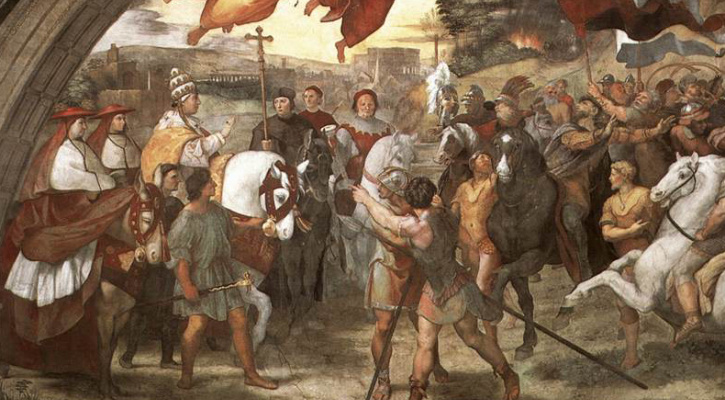Saint Leo the Great, Saint of the day for 10 November

Saint of the day for November 10
(m.10 November 461)
The story of St. Leo the Great
With an apparent strong conviction of the importance of the Bishop of Rome in the Church and of the Church as a continuous sign of Christ's presence in the world, Leo the Great showed infinite dedication as pope. Elected in 440, he worked tirelessly as a "successor of Peter", leading his fellow bishops as "equals in the episcopate and in infirmities".
Leo is known as one of the best administrative popes of the ancient Church. His work has branched out into four main areas, indicative of his notion of the pope's total responsibility for Christ's flock. He worked extensively to control the heresies of Pelagianism - overemphasizing human freedom - Manichaeism - seeing all material as evil - and others, by placing demands on their followers so as to guarantee true Christian beliefs.
A second major area of his concern was the doctrinal controversy in the Church in the East, to which he responded with a classic letter spelling out the Church's teaching on the two natures of Christ. With strong faith he also led the defense of Rome against the attack of the barbarians, assuming the role of peacemaker.
In these three areas, Leo's work has been highly regarded. His growth in holiness has its basis in the spiritual depth with which he approached the pastoral care of his people, which was the fourth focus of his work. He is known for his spiritually profound sermons. An instrument of the call to holiness, an expert in Scripture and ecclesiastical awareness, Leo had the ability to reach out to the daily needs and interests of his people. One of his sermons is used in the Office of Readings at Christmas.
Of Leo it is said that its true meaning lies in his doctrinal insistence on the mysteries of Christ and the Church and in the supernatural charisms of the spiritual life given to humanity in Christ and in his Body, the Church. Thus Leo firmly believed that everything he did and said as pope for the administration of the Church represented Christ, the head of the Mystical Body, and Saint Peter, in whose place Leo was acting.
Reflection
At a time when there is widespread criticism of Church structures, we also hear criticisms that bishops and priests - indeed, all of us - are too concerned about the administration of temporal matters. Pope Leo is an example of a great administrator who used his talents in areas where spirit and structure are inextricably combined: doctrine, peace and pastoral care. He avoided an "angelism" that seeks to live without the body, as well as "practicality" that deals only with outsiders.